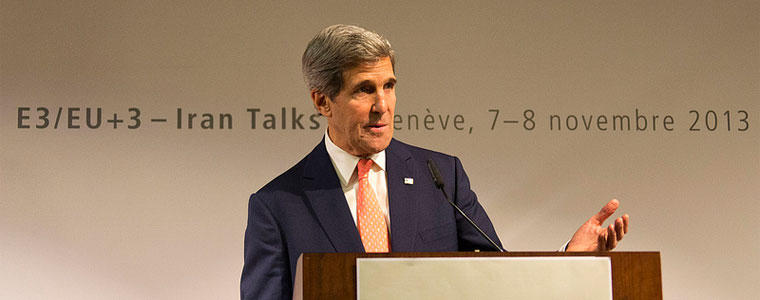Iran Agreement Sets Agenda for Talks Toward Larger Pact
The agreement with Iran penned in Geneva is a significant step because it creates an agenda for cooperative and reciprocal action between Iran and its powerful foes that has not existed before. Without such a deal – even one as short-lived as this six-month framework – no larger agreement is really possible.

The agreement delineates a plan for real, cooperative activities that achieve initial goals for each side: some of the sanctions relief sought by Iran, and Tehran’s freeze on nuclear progress sought by the P5+1 group (made up of the five permanent members of the United Nations Security Council – the U.S., U.K., France, Russia and China, plus Germany). After a decade of secret nuclear development and continued hostility with the West and other nations, Iran must now permit the UN’s International Atomic Energy Agency (IAEA) to inspect some sites that have not been available for monitoring.
Skeptics argue that the Iranians cannot be trusted. But because the agreement is an agenda for specific actions, trust does not enter into this interim equation. Each side has pledged to take actions that either will be verified to occur or not. The IAEA inspectors will either verify if centrifuges are locked down and existing uranium above the 5 percent level is properly diluted, or report that they were not. Iranian petrochemicals sales and access to gold holdings, both of which have been subject to sanctions, will either be available now to Tehran, or they will not.
But if and when each side does deliver on these pledges, it will be the first reciprocal acts of such security significance in more than 30 years. That has the potential to gather more momentum in the direction of greater cooperation toward shared goals of peaceful uranium development and sanctions relief.
A further degree of confidence in this Geneva agenda emerges from the data of history. Over the past three decades, a diverse set of nations have been persuaded to forego their nuclear programs when an array of actions is creatively negotiated between them and those seeking an end to such a program.
The pattern unfolds in this manner:
- The condemnation of the target nation’s nuclear program (and actions like sanctions that punish the nation for its activities) retards the development of the program and adversely affects the target;
- The sanctioning states - recognizing the success of the coercion - engage in negotiations that lead to a plan to reduce the condemnation/punishment in exchange for a halt and ultimately a reversal of nuclear development which will be verified by inspections;
- Then either the loosening of sanctions or suspension can be used as a further incentive as progress in nuclear reduction can be verified - OR the powerful states offer fully new resources as carrots to stimulate yet more denuclearization progress;
- Economic relief from sanctions and/or the injection of economic rewards and incentives to the target nation strengthens the case that a new security relationship between states is workable without nuclear weapons.
This approach worked with Argentina and Brazil when they were on the verge of nuclear weapons development. It led South Africa to dismantle its six or seven fully functional weapons and production reactors. In Libya, Colonel Muammar Gadhafi permitted extraction of the few but real weapons he had developed. It was expensive on the carrots side, but the approach worked with Ukraine when it inherited, but then gave up, a large portion of the Soviet nuclear arsenal.
After 30 years of hostility toward Iran, the U.S. and its partners would never move to any larger agreement unless such a first step sets up an agenda for action that can be verified and achieved. This agreement provides that, as well as a timely boost in confidence that a long-time Washington goal – attaining Iranian denuclearization through diplomacy – is closer to being reached.
George A. Lopez is vice president of USIP’s Academy for International Conflict Management and Peacebuilding. For documents related to the agreement and more analysis, see USIP’s Iran Primer, produced in partnership with the Woodrow Wilson International Center for Scholars.



